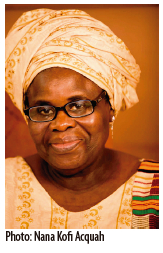Servicios Personalizados
Articulo
Indicadores
Links relacionados
-
 Citado por Google
Citado por Google -
 Similares en Google
Similares en Google
Compartir
Tydskrif vir Letterkunde
versión On-line ISSN 2309-9070
versión impresa ISSN 0041-476X
Tydskr. letterkd. vol.60 no.2 Pretoria 2023
http://dx.doi.org/10.17159/tl.v60i2.17335
TRIBUTES
Kwabena Opoku-Agyemang
Senior lecturer in the Department of English, Faculty of Arts University of Ghana, Accra, Ghana. Email: kdopoku-agyemang@ug.edu.gh; https://orcid.org/0000-0002-5149-6128

I first met Ama Ata Aidoo as most Ghanaians from my generation would: through one of her many literary works. In my case, I read the short story "Two Sisters" from the collection No Sweetness Here as a teenager. I was struck by the boldness of the main character Mercy, who used her beauty to attract a politician; his money (that he had misappropriated from government coffers) cushioned her through the economic downturn that plagued a newly independent Ghana. While her sister Connie was more conservative and aligned to the status quo, Mercy viewed her response to economic hardship as a pragmatic mode of survival. This story stuck with me and ended up being one of the primary texts for my first publication, which appeared in Research in African Literatures. My article examined how Aidoo and Chimamanda Ngozi Adichie used illicit relationships to critique nation building.
Aspects of "Two Sisters" dovetailed neatly with Adichie's short story "Birdsong," testament to the influence that Aidoo and that pioneering generation of African women writers who navigated formidable obstacles during the wave of independence had on later generations such as Adichie. That early generation established their presence in literary, social, and political terms, serving as direct catalysts for subsequent generations of both men and women writers, while leaving an indelible mark on the postcolonial literary landscape. Aidoo, undeniably, stood as an iconic figure within this evolution. She grew up through colonial times and saw firsthand how Ghana struggled with neocolonialism and nation building. Her work critiqued these struggles and served as an important literary parallel to the development of the country.
News of Aidoo's death on May 31, 2023, drew global headlines, prompting an outpouring of local and international tributes that encapsulated the profound legacy of this remarkable Ghanaian figure. A scholar, writer, playwright, poet, and activist, her lively personality stood in stark contrast the fact that an unfortunate car accident had forced her to use a stick and later a wheelchair for mobility purposes. She still showed up to numerous public events and ardently supported the literary scene in Ghana and in other parts of Africa.
I was fortunate to know her on a personal and professional level: I worked with and for her at Mbaasem, an NGO she founded and run with passion. The aim of the foundation was to provide comprehensive support for and promotion of young African writers, catering to their logistical, conceptual, financial, and professional needs. Mbaasem, which translates to "women's matters" in Fante, served as a platform through which Aidoo also fervently mentored women, nurturing and cultivating their writing craft.
During my two-year tenure at Mbaasem, our small but motivated team diligently curated literary works of budding and amateur writers for eventual publication in the Daily Graphic, Ghana's largest state-owned newspaper. Week after week, we meticulously edited a diverse array of literary pieces, including short stories, poems, extracts from novels, and plays, striving to offer these emerging talents a platform for recognition and growth. Aidoo, despite the scarcity of resources, steadfastly sustained this initiative. Through the Daily Graphic, she was able to nurture the talent and trajectory of numerous writers, which included Yaba Badoe, Ayesha Haruna Atta, and Mamle Kabu.
Aidoo's unyielding commitment to perfectionism was evident in her approach as lead editor. She always emphasized the mastery of various literary elements, consistently striving to ensure that every piece featured under the auspices of the Mbaasem editorial team adhered to a stringent standard. She was not averse to rewording and refining lines of poetry for enhanced coherence and cohesion; rephrasing diction in short stories; and even changing character or scene considerations in other narrative forms that eventually appeared in the Daily Graphic. All these actions underscored her dedication to nurturing quality literary expression.
Her passionate engagement with the younger generation of writers mirrored her own journey decades prior when she caught attention as a young writer. Notably, her first play, Dilemma of a Ghost (1965), was produced during her final year as an undergraduate at the University of Ghana. A year after it was performed at the University's School of Performing Arts, it was printed and distributed by Longman, making Aidoo the first published woman playwright from Africa. This seminal work offered a profound exploration of African and African American relations, ultimately solidifying its place as a pivotal contribution to Ghana's contemporary cultural heritage. It was notably showcased at Accra's National Theatre during the nation's golden jubilee celebrations in 2007 and won several awards. While her novels, poems, and short stories also highlighted her other literary skills, and she was a giant in the field with an unapologetic defense of women's rights and women's development.
"Prof," as we called her, has left a void in joining her ancestors. Her warmth, sense of humour, care for ordinary people, and sense of justice made her a beautiful soul inside and out. She will be missed terribly, but the best we can do is to uphold her legacy by continuing to uphold her values and unpack the intricacies of her work through scholarship. After all, as she famously said once: "Humans, not places, make memories."














